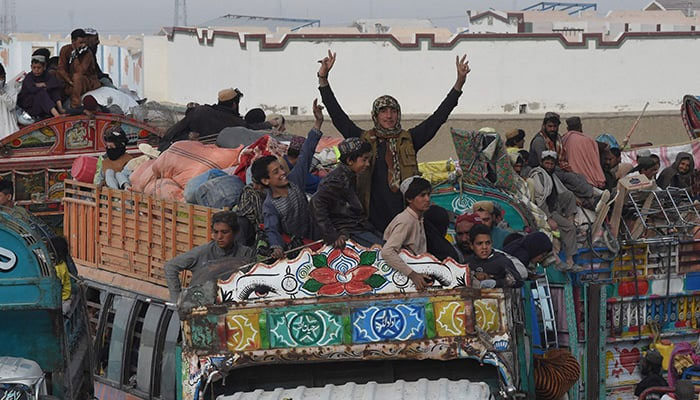Call for conference on repatriation, resettlement of Afghan refugees
Islamabad : Muhammad Abbas Khan, Chief Commissioner for Afghan Refugees (CCAR), Ministry of States and Frontier Regions (SAFRON), has said that government should host an international multilateral stakeholders conference to address the challenges related to voluntary repatriation and third-country resettlement of Afghan refugees.
Mr Khan was speaking at a seminar on “Challenges and opportunities in repatriation and resettlement of Afghan refugees” organised by Institute of Regional Studies (IRS) here Tuesday.
Mr Khan added that the main objective of the conference should be to encourage the Western countries to increase their quotas and expedite the process for admitting Afghan applicants into their countries from Pakistan. He advocated the importance of international burden-sharing urging global stakeholders to enhance resettlement opportunities for Afghan citizens on Pakistani soil. The Chief Commissioner shared that there were around 600,000 Afghan resettlement applicants registered with the United Nations High Commissioner for Refugees but that UNHCR’s quota for resettlement applications for the year was 8,000.
He highlighted the immense challenges associated with repatriating Afghan refugees. Forced displacement, he noted, was a cross-cutting issue, encompassing social, political, economic, and security dimensions and increasingly intersecting with climate change. He added that Afghanistan’s fragile absorption capacity and limited infrastructure made reintegration of the returning Afghan citizens a challenging proposition. He further stressed the importance of addressing psychosocial adjustment challenges and called for efforts to create a secure and investment-friendly environment in Afghanistan to support sustainable reintegration.
The chief commissioner shared that Pakistan repatriated over 4 million Afghan refugees since 2002 and argued that most of the refugee population of 2024 was born and raised in Pakistan and were dependent on Pakistan for economic, health and educational services. He further stated that Afghanistan capacity to absorb large numbers of refugees was highly limited. Despite these hurdles, Mr Khan expressed hope that the refugees, 70 per cent of whom are under the age of 30, had the potential to contribute significantly to Afghanistan’s reconstruction. Highlighting Pakistan’s contributions to hosting millions of Afghan refugees over decades, the he underscored the peculiar characteristics of Pakistan’s Afghan refugee situation. He called for a balanced approach towards the subject of Afghan refugees grounded in up-to-date and reliable facts and figures rather than misplaced perceptions.
-
 Chinese New Year Explained: All You Need To Know About The Year Of The Horse
Chinese New Year Explained: All You Need To Know About The Year Of The Horse -
 Canadian Passport Holders Can Now Travel To China Visa-free: Here's How
Canadian Passport Holders Can Now Travel To China Visa-free: Here's How -
 Glen Powell Reveals Wild Prank That Left Sister Hunting Jail Cells
Glen Powell Reveals Wild Prank That Left Sister Hunting Jail Cells -
 Edmonton Weather Warning: Up To 30 Cm Of Snow Possible In Parts Of Alberta
Edmonton Weather Warning: Up To 30 Cm Of Snow Possible In Parts Of Alberta -
 'A Knight Of The Seven Kingdoms' Episode 5: What Time It Airs And Where To Stream
'A Knight Of The Seven Kingdoms' Episode 5: What Time It Airs And Where To Stream -
 Amy Schumer Drops Cryptic Message On First Valentine Amid Divorce
Amy Schumer Drops Cryptic Message On First Valentine Amid Divorce -
 Savannah Guthrie Sends Desperate Plea To Mom Nancy Kidnapper
Savannah Guthrie Sends Desperate Plea To Mom Nancy Kidnapper -
 NBA All-Star 2026 Shake-up: Inside The New USA Vs World Tournament Format
NBA All-Star 2026 Shake-up: Inside The New USA Vs World Tournament Format -
 Warner Bros Consider Reopening Deal Talks With Paramount, Says Reports
Warner Bros Consider Reopening Deal Talks With Paramount, Says Reports -
 Andrew Mountbatten Windsor Faces Future With UK MPs, Says Expert
Andrew Mountbatten Windsor Faces Future With UK MPs, Says Expert -
 Eva Mendes Shared Bedroom Photos For Ryan Gosling On Valentine’s
Eva Mendes Shared Bedroom Photos For Ryan Gosling On Valentine’s -
 Shamed Andrew Told 'nobody Is Above The Law' Amid Harrowing Silence
Shamed Andrew Told 'nobody Is Above The Law' Amid Harrowing Silence -
 Gisele Bundchen Melts Hearts With Sweet Bike Ride Glimpse Featuring Son
Gisele Bundchen Melts Hearts With Sweet Bike Ride Glimpse Featuring Son -
 Prince William Found Meghan Markle ‘quite Refreshing’ At Start
Prince William Found Meghan Markle ‘quite Refreshing’ At Start -
 Kate Middleton Knew Should Could Not Be ‘voice Of Reason’ With Prince Harry
Kate Middleton Knew Should Could Not Be ‘voice Of Reason’ With Prince Harry -
 Rihanna Has Wardrobe Malfunction At A$AP Rocky Fashion Show
Rihanna Has Wardrobe Malfunction At A$AP Rocky Fashion Show




